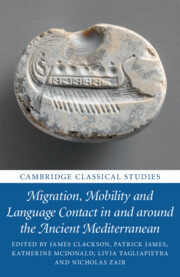Book contents
- Migration, Mobility and Language Contact in and around the Ancient Mediterranean
- Cambridge Classical Studies
- Migration, Mobility and Language Contact in and around the Ancient Mediterranean
- Copyright page
- Dedication
- Contents
- Figures
- Tables
- Contributors
- Acknowledgements
- Abbreviations of Ancient Authors and Works
- Abbreviations of Modern Sources
- Chapter 1 Introduction
- Chapter 2 Interethnic Mobility and Integration in Pre-Roman Etruria
- Chapter 3 Elusive Migrants of Ancient Italy
- Chapter 4 The Language of Mobile Craftsmen in the Western Mediterranean
- Chapter 5 Lost – and Found – in Transmission
- Chapter 6 Mobility and Orthography
- Chapter 7 The Mamertini in Messina
- Chapter 8 Migration, Identity, and Multilingualism in Late Hellenistic Delos
- Chapter 9 Interpretes, Negotiatores and the Roman Army
- Chapter 10 HOC PRIMVS VENIT
- Chapter 11 Population, Migration and Language in the City of Rome
- References
- Index Locorum
- Subject Index
Chapter 10 - HOC PRIMVS VENIT
Italians and Others in Egypt before the Caesars
Published online by Cambridge University Press: 12 May 2020
- Migration, Mobility and Language Contact in and around the Ancient Mediterranean
- Cambridge Classical Studies
- Migration, Mobility and Language Contact in and around the Ancient Mediterranean
- Copyright page
- Dedication
- Contents
- Figures
- Tables
- Contributors
- Acknowledgements
- Abbreviations of Ancient Authors and Works
- Abbreviations of Modern Sources
- Chapter 1 Introduction
- Chapter 2 Interethnic Mobility and Integration in Pre-Roman Etruria
- Chapter 3 Elusive Migrants of Ancient Italy
- Chapter 4 The Language of Mobile Craftsmen in the Western Mediterranean
- Chapter 5 Lost – and Found – in Transmission
- Chapter 6 Mobility and Orthography
- Chapter 7 The Mamertini in Messina
- Chapter 8 Migration, Identity, and Multilingualism in Late Hellenistic Delos
- Chapter 9 Interpretes, Negotiatores and the Roman Army
- Chapter 10 HOC PRIMVS VENIT
- Chapter 11 Population, Migration and Language in the City of Rome
- References
- Index Locorum
- Subject Index
Summary
Some accidents of preservation, reuse, discovery, and publication are fascinating. It so happens that the earliest Latin inscription known from Egypt claims, it seems, that, on 26 August 116, one Acutius was the first (Italian or writer of Latin) to reach the sanctuary of Isis on the island of Philae in Upper Egypt and to leave a legible mark in Latin (I.Syène 321). For him to be able to make such an absolute claim, we must assume that no Latin was visible amid the many Greek inscriptions then at Philae and that there were no indications of Italians in those Greek inscriptions. If others had preceded him without leaving written evidence, they were as invisible to Acutius as they are to us. Or, Acutius may have made a relative claim: to be the first, in some respect, in relation to those who accompanied him that day and also incised their names. We can only speculate about just how competitive Acutius was in relation to his companions.
- Type
- Chapter
- Information
- Publisher: Cambridge University PressPrint publication year: 2020

